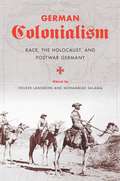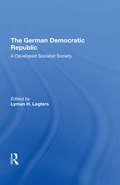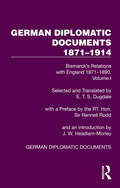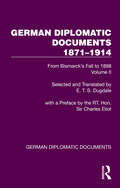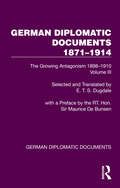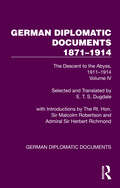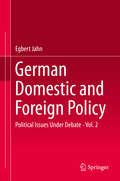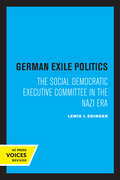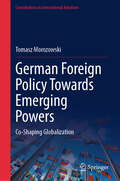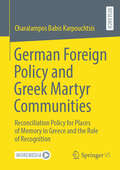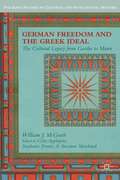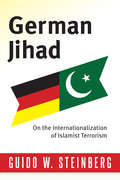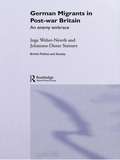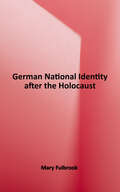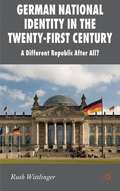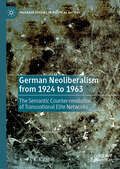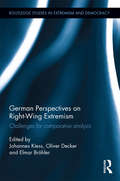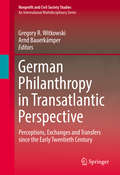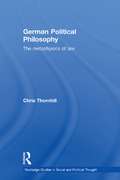- Table View
- List View
German Colonialism:
by Sebastian Conrad Sorcha O'HaganGermany was a latecomer to the colonial world of the late nineteenth century but this history of German colonialism makes clear the wide-reaching consequences of Germany's short-lived colonial project. Sebastian Conrad charts the expansion of the empire from its origins in the acquisition of substantial territories in present day Togo, Cameroon, Namibia and Tanzania to new settlements in East Asia and the Pacific and reveals the colonialist culture which permeated the German nation and its politics. Drawing on the wider history of European expansion and globalisation he highlights the close interactions and shared vocabularies of the colonial powers and emphasises Germany's major role in the period of high imperialism before 1914. Even beyond the official end of the empire in 1919 the quest for Lebensraum and the growth of the Nazi empire in Eastern Europe can be viewed within a framework of colonialism whose effects resonate to the present day.
German Colonialism: Race, the Holocaust, and Postwar Germany
by Mohammad Salama Volker LangbehnMore than half a century before the mass executions of the Holocaust, Germany devastated the peoples of southwestern Africa. While colonialism might seem marginal to German history, controversial new scholarship compares the acts of this period with Nazi practices on the Eastern and Western fronts. Examples of the most important research conducted on the "continuity thesis" over the past five years, the chapters in this anthology debate the connections between German colonialist activities and the behavior of Germany during World War II. Some argue that the country's domination of southwestern Africa gave rise to perceptions of racial difference and superiority at home, contributing to a nascent nationalism that blossomed into National Socialism and the Holocaust. Others remain skeptical, and both sides are well-represented. Contributors merge Germany's colonial past with debates over the country's identity and history and compare its colonial crimes with other European ventures. Issues discussed range from the denial or marginalization of German genocide to the place of colonialism and the Holocaust within Germany and Israel's postwar relations. Authors also compare the legacy of genocide in both Europe and Africa.
German Colonialism: Race, the Holocaust, and Postwar Germany (Routledge Studies In Modern European History Ser.)
by Mohammad Salama Eds. Langbehn VolkerMore than half a century before the mass executions of the Holocaust, Germany devastated the peoples of southwestern Africa. While colonialism might seem marginal to German history, new scholarship compares these acts to Nazi practices on the Eastern and Western fronts. With some of the most important essays from the past five years exploring the "continuity thesis," this anthology debates the links between German colonialist activities and the behavior of Germany during World War II. Some contributors argue the country's domination of southwestern Africa gave rise to perceptions of racial difference and superiority at home, building upon a nascent nationalism that blossomed into National Socialism and the Holocaust. Others remain skeptical and challenge the continuity thesis. The contributors also examine Germany's colonial past with debates over the country's identity and history and compare its colonial crimes with other European ventures. Other issues explored include the denial or marginalization of German genocide and the place of colonialism and the Holocaust within German and Israeli postwar relations.
German Democratic Republ/h
by Lyman H. LegtersThe shifting patterns of relationships in Central and Eastern Europe require that students of international relations be well versed in the attitudes and internal structures of the nations involved. Until now, material in English on the German Democratic Republic has consisted primarily of journalistic reminiscences or narrow scholarly treatments. Recognizing the need and responding to it, the authors of this book—leaders in the study of the GDR—present an up-to-date and comprehensive look at the country, focusing on domestic political and social change. The authors are agreed that the GDR is not only here to stay, but is also a rather stable society that can withstand moderate, well-regulated processes of change. They address education, intellectual life, the military, foreign relations, and the economy, as well as the customary subjects of politics and governmental direction.
German Diplomatic Documents 1871–1914 Volume 1: Bismarck’s Relations with England 1871–1890 (German Diplomatic Documents 1871–1914)
by Dugdale, E. T. S. Rennell Rodd Headlam-Morley, J. W.Originally published in English in 1928, this volume deals mainly with Anglo-German relations at the end of the 19th Century. Chancellor Otto von Bismarck’s voice can be heard clearly in the documents which give an extensive picture of the alternating phases of relations between Great Britain and Germany, as influenced by their respective obligations and interests in the international issues which united or divided the Powers over a period of twenty years. The strongest impression which these documents leave is the revelation of how greatly the mentality of the western world changed since they were drafted, and especially during the decade which came after World War I. The shaping of policy, as exhibited in these despatches and memoranda, is governed almost exclusively by the ultimate idea of war as the deciding factor. The menace of war and the prospects of success or failure in aggression or defence appear to be the essential motives of policy.
German Diplomatic Documents 1871–1914 Volume 2: From Bismarck's Fall to 1898 (German Diplomatic Documents 1871–1914)
by Charles Eliot Dugdale, E. T. S.Originally published in English in 1929, this second volume of the German Diplomatic Documents covers a much shorter period: 1890–1898. During this period there was no war or revolution in Europe, but the sphere of German and indeed European politics became enlarged. The documents in this volume deal with questions raised by diverse regions such as Armenia, Morocco, Tunisia, Tripoli, South Africa, Crete and Cuba. The papers here reissued show that colonial expansion is a recognised part of the official German programme. As with the first volume, the policy exhibited in the despatches of this volume are governed almost exclusively by the ultimate idea of war.
German Diplomatic Documents 1871–1914 Volume 3: The Growing Antagonism 1898–1910 (German Diplomatic Documents 1871–1914)
by Dugdale, E. T. S. Maurice De BunsenOriginally published in 1930, this volume opens with some selections dealing with the situation created by the victory of Japan over China in 1904 which opened a new epoch in the history of the Far East. It includes two momentous conflicts profoundly affecting international relations – the Boer War and the Russo-Japanese War. It also touches at many points on the long discussions aiming at a naval agreement, with or without some form of general understanding, between England and Germany. Through the Alliance with Japan and the Entente with France it leads up to the separation of Europe into two rival camps, in the course of an evolution in which crisis followed crisis with increasing and often alarming intensity.
German Diplomatic Documents 1871–1914 Volume 4: The Descent to the Abyss, 1911–1914 (German Diplomatic Documents 1871–1914)
by Dugdale, E. T. S. Malcolm Robertson Herbert RichmondOriginally published in English in 1931, this fourth and final volume of documents brings the reader to the brink of World War I. The despatches beg the question of whether war was inevitable and if so, could it have been postponed? The question of whether the British Empire needed to have taken part in it, and how far its action or inaction was responsible for the outbreak is also discussed.
German Domestic and Foreign Policy
by Egbert JahnThis volume analyses current German domestic and foreign policy debates of international relevance. By reflecting their contemporary historical background and discussing the logic behind the different positions in a dispute, the author considers issues such as whether Muslim women should be allowed to wear headscarves, fears about immigration, the predominance of either a single national culture or multicultural pluralism and the admissibility of multiple citizenship. This book also sheds new light on the debate over the boundaries of freedom of expression, which was triggered by the so-called Danish "Mohammad cartoons. " Aspects of German foreign policy are addressed, including the debate on the ratification of a European constitutional treaty and of the Treaty of Lisbon, German attempts to obtain a permanent seat on the Security Council, as well as the question of whether the deployment of the German army in Afghanistan contributed to the defense of Germany. This book is of interest to students and scholars of political sciences, as well as to journalists and practitioners interested in an analysis of current political debates in Germany.
German Exile Politics: The Social Democratic Executive Committee in the Nazi Era
by Lewis J. EdingerThis title is part of UC Press's Voices Revived program, which commemorates University of California Press’s mission to seek out and cultivate the brightest minds and give them voice, reach, and impact. Drawing on a backlist dating to 1893, Voices Revived makes high-quality, peer-reviewed scholarship accessible once again using print-on-demand technology. This title was originally published in 1956.
German Expansionism, Imperial Liberalism, and the United States, 1776-1945
by Jens-Uwe GuettelThis book traces the importance of the United States for German colonialism from the late eighteenth century to 1945, focusing on American westward expansion and racial politics. Jens-Uwe Guettel argues that from the late eighteenth century onward, ideas of colonial expansion played a very important role in liberal, enlightened, and progressive circles in Germany, which, in turn, looked across the Atlantic to the liberal-democratic United States for inspiration and concrete examples. In the early years of the twentieth century, this America-inspired and -influenced imperial liberalism dominated German colonial discourse and practice. Yet following this pre-1914 peak of liberal political influence on the administration and governance of Germany's colonies, the expansionist ideas embraced by Germany's far-right after the country's defeat in the First World War had little or no connection with the German Empire's liberal imperialist tradition. German Expansionism, Imperial Liberalism, and the United States, 1776-1945 therefore shows that, for example, Nazi plans for the settlement of conquered Eastern European territories were not directly linked to pre-1914 transatlantic exchanges concerning race and expansionism.
German Foreign Policy Towards Emerging Powers: Co-Shaping Globalization (Contributions to International Relations)
by Tomasz MorozowskiThis book examines the complex process of German foreign policy adaptation to a shifting global landscape, especially to the rise of new powers. Addressing a scholarly audience, the book sheds light on the evolution of Germany's post-reunification international role beyond the Euro-Atlantic structure. Grounded within the theoretical framework of neoclassical realism, the book analyzes the inner workings of Germany's global policy formation. It scrutinizes the state's relations with rising and emerging powers, including China, Brazil, India, South Africa, Mexico, Vietnam, Indonesia, Nigeria, Saudi Arabia, and the United Arab Emirates, exploring the details of Berlin's approach. The book presents the motives, goals, instruments, and future prospects of Germany's foreign policy regarding these states. It further explores the dynamics of Germany's civilian and economic power, while addressing the growing call for increased responsibility within the European Union as well as in global politics. Readers will gain insight into the foundations, tools, and effectiveness of Germany's foreign policy, providing a quintessential case study of how a European state navigates the challenges of a rapidly changing global landscape. This makes the book a must-read for researchers specializing in German studies as well as for scholars of international relations and foreign policy.
German Foreign Policy and Greek Martyr Communities: Reconciliation Policy for Places of Memory in Greece and the Role of Recognition
by Charalampos KarpouchtsisThe Euro crisis of 2008 had a deep impact on German-Greek relations. The exchange of blows in media, and amongst politicians created a deep divide and made old wounds visible - wounds that lie in the Occupation of Greece by Nazi Germany and its fascist allies during World War 2. In 2014 German foreign policy towards Greece shifted to include reconciliatory measures, marking the beginning of Germany's foreign policy of reconciliation. One area of focus is memory culture and the Greek martyr communities, meaning villages and towns that experienced extreme violence, destruction, and executions. Diving into these places of terror and memory, the book analyzes German foreign policy of reconciliation while providing a profound view onto history, diplomacy, and the widely unknown Greek memory landscape. It entails a thorough review of German-Greek relations, more than seven unique maps and 10 case studies, accompanied by photographs and over 35 interviews. It shows how foreign policy, conflict and reconciliation intertwine and how international affairs meet the local level of everyday citizens.
German Freedom And The Greek Ideal
by William J. McgrathThis book traces this German idea of freedom from the late Enlightenment through the early twentieth century. McGrath shows how German intellectual and artists invoked the ancient Greeks in order to inspire Germans to cultural renewal and to enrich their understanding of freedom as something deeper and more urgent that political life could offer.
German Intellectuals and the Challenge of Democratic Renewal
by Sean A. FornerThis book examines how democracy was rethought in Germany in the wake of National Socialism, the Second World War and the Holocaust. Focusing on a diverse network of public intellectuals in the immediate post-war occupation years, Sean A. Forner traces their attempts to reckon with the experience of Nazism and scour Germany's ambivalent political and cultural traditions for materials with which to build a better future. In doing so, he reveals, they formulated an internally variegated but distinctly participatory vision of democratic renewal - a paradoxical counter-elitism of intellectual elites. Although their projects ran aground on internal tensions and on the Cold War, their commitments fuelled critique and dissent in East and West during the 1950s and thereafter. The book uncovers a conception of political participation that went beyond the limited possibilities of the Cold War era and which would influence the political struggles of later decades in both post-war Germanys.
German Jihad: On the Internationalization of Islamist Terrorism
by Guido W. SteinbergSince 2007, the German jihadist scene has become Europe’s most dynamic, characterized by an extreme anti-Americanism, impressive international networks, and spectacular propaganda. German jihadists travel to Turkey, Chechnya, Pakistan, and Afghanistan, trading in jihadist ideologies and allying themselves with virulent organizations. Mapping the complicated interplay between jihadists’ personal motivations and the goals and strategies of the world’s major terrorist groups, Guido Steinberg provides the first analysis of German jihadism, its links to Turkey, and its growing, global operational importance. Steinberg follows the formation of German-born militant networks in German cities and their radicalization and recruitment. He describes how these groups join up with al-Qaeda-affiliated organizations in Afghanistan and Pakistan, such as the Islamic Jihad Union, the Islamic Movement of Uzbekistan, and the Taliban, and he plots the path that directly involves them in terrorist activities. Situating these developments within a wider global context, Steinberg interprets the expanding German scene as part of a greater internationalization of jihadist ideology and strategy, swelling the movement’s membership since 9/11. Increasing numbers of Pakistanis, Afghans, Turks, Kurds, and European converts have come to the aid of Arab al-Qaeda, an incremental integration that has worrisome implications for the national security of Germany, the United States, and their allies.
German Jihad: On the Internationalization of Islamist Terrorism (Columbia Studies in Terrorism and Irregular Warfare)
by Guido SteinbergSince 2007, the German jihadist scene has become Europe's most dynamic, characterized by an extreme anti-Americanism, impressive international networks, and spectacularly effective propaganda. German jihadists travel to Turkey, Chechnya, Pakistan, and Afghanistan, trading jihadist ideologies and allying themselves with virulent organizations. Mapping the complicated interplay between jihadists' personal motivations and the goals and strategies of the world's major terrorist groups, Guido W. Steinberg provides the first analysis of German jihadism, its links to Turkey, and its growing, global operational importance.Steinberg follows the formation of German-born militant networks in German cities and their radicalization and recruitment. He describes how these groups join al-Qaeda-affiliated organizations in Afghanistan and Pakistan, such as the Islamic Jihad Union, the Islamic Movement of Uzbekistan, and the Taliban, and he plots the path that directly involves them in terrorist activities. Situating these developments within a wider global context, Steinberg interprets the expanding German scene as part of a greater internationalization of jihadist ideology and strategy, swelling the movement's membership since 9/11. Increasing numbers of Pakistanis, Afghans, Turks, Kurds, and European converts are coming to the aid of Arab al-Qaeda, an incremental integration that has worrisome implications for the national security of Germany, the United States, and their allies.
German Migrants in Post-War Britain: An Enemy Embrace (British Politics and Society)
by Dr Inge Weber-Newth Johannes-Dieter SteinertBoth timely and topical, with 2005 marking the 60th anniversary of the end of the Second World War, this unique book examines the little-known and under-researched area of German migration to Britain in the immediate post-war era. Authors Weber-Newth and Steinert analyze the political framework of post-war immigration and immigrant policy, and the complex decision-making processes that led to large-scale labour migration from the continent. They consider: * identity, perception of self and others, stereotypes and prejudice* how migrants dealt with language and intercultural issues* migrants' attitudes towards national socialist and contemporary Germany* migrants' motivation for leaving Germany* migrants' initial experiences and their reception in Britain after the war, as recalled after 50 years in the host country, compared to their original expectations. Based on rich British and German governmental and non-governmental archive sources, contemporary newspaper articles and nearly eighty biographically–oriented interviews with German migrants, this outstanding volume, a must-read for students and scholars in the fields of social history, sociology and migration studies, expertly encompasses political as well as social-historical questions and engages with the social, economic and cultural situation of German immigrants to Britain from a life-historical perspective.
German Migrants in Post-War Britain: An Enemy Embrace (British Politics and Society)
by Dr Inge Weber-Newth Johannes-Dieter SteinertBoth timely and topical, with 2005 marking the 60th anniversary of the end of the Second World War, this unique book examines the little-known and under-researched area of German migration to Britain in the immediate post-war era. Authors Weber-Newth and Steinert analyze the political framework of post-war immigration and immigrant policy, and the complex decision-making processes that led to large-scale labour migration from the continent. They consider:* identity, perception of self and others, stereotypes and prejudice* how migrants dealt with language and intercultural issues* migrants' attitudes towards national socialist and contemporary Germany* migrants' motivation for leaving Germany* migrants' initial experiences and their reception in Britain after the war, as recalled after 50 years in the host country, compared to their original expectations.Based on rich British and German governmental and non-governmental archive sources, contemporary newspaper articles and nearly eighty biographically–oriented interviews with German migrants, this outstanding volume, a must-read for students and scholars in the fields of social history, sociology and migration studies, expertly encompasses political as well as social-historical questions and engages with the social, economic and cultural situation of German immigrants to Britain from a life-historical perspective.
German National Identity after the Holocaust
by Mary FulbrookFor over half a century, Germans have lived in the shadow of Auschwitz. Who was responsible for the mass murder of millions of people in the Holocaust: just a small gang of evil men, Hitler and his henchmen; certain groups within a particular system; or even the whole nation? Could the roots of malignancy be traced far back in German history? Or did the Holocaust have more to do with European modernity? Should Germans live with a legacy of guilt forever? And how, if at all, could an acceptable German national identity be defined? These questions dogged public debates in both East and West Germany in the long period of division. Both states officially claimed to have "overcome the past" more effectively than the other; both sought to construct new, opposing identities as the "better Germany". But, in different ways, official claims ran at odds with the kaleidoscope of popular collective memories; dissonances, sensitivities, and taboos were the order of the day on both sides of the Wall. And in the 1990s, with continued heated debates over past and present, it was clear that inner unity appeared to be no automatic consequence of formal unification. Drawing on a wide range of material - from landscapes of memory and rituals of commemoration, through private diaries, oral history interviews, and public opinion poll surveys, to the speeches of politicians and the writings of professional historians - Fulbrook provides a clear analysis of key controversies, events, and patterns of historical and national consciousness in East and West Germany in equal depth. Arguing against "essentialist" conceptions of the nation, Fulbrook presents a theory of the nation as a constructed community of shared legacy and common destiny, and shows how the conditions for the easy construction of any such identity have been notably lacking in Germany after the Holocaust. This book will be of interest to advanced undergraduate and postgraduate students in history, politics, and German and European Studies, as well as established scholars and interested members of the public.
German National Identity in the Twenty-First Century
by Ruth WittlingerWittlinger takes a fresh look at German national identity in the 21st century and shows that it has undergone considerable changes since unification in 1990. Due to the external pressures of the post-cold war world and recent domestic developments, Germany has re-emerged as a nation which is less hesitant to assert its national interest.
German Neoliberalism from 1924 to 1963: The Semantic Counter-revolution of Transnational Elite Networks (Palgrave Studies in Political History)
by Arne I. KäthnerThis book offers an in-depth study of German neoliberalism between 1924 and 1963, arguing that a neoliberal network was established in the interwar period, decades before elite networks in Great Britain and the United States fostered the ‘neoliberal revolution’ of the Thatcher and Reagan administrations. The author shows how this network strongly influenced societal developments in the 1950s and set a precedent for neoliberal projects in other countries. This success was largely due to the deliberate and strategic reorganisation of the semantic field: abandoning or reacquiring ‘abused’ concepts, challenging existing meanings, or introducing new concepts to the political scene. The book examines the Aktionsgemeinschaft Soziale Marktwirtschaft (ASM), an early neoliberal Think Tank founded in 1953 and led by Alexander Rüstow, which became an influential political actor in post-war West Germany. The author adopts a decidedly transnational approach linking and contrasting inner-German debates with those taking place transnationally among neoliberal proponents in the Mont Pèlerin Society. More than just a political study of ideologies, this book provides a historical account of the conceptual struggles over neoliberalism, the actors who engaged in them, the spheres in which they took place, and the semantic means and conceptual strategies employed, providing useful insights for scholars of German and political history, as well as political science more generally.
German Perspectives on Right-Wing Extremism: Challenges for Comparative Analysis (Extremism and Democracy)
by Oliver Decker Johannes Kiess Elmar BrählerThis book discusses right-wing extremism by analysing Germanophone research on this topic for the first time in English, including unique survey data from Germany and Austria. Highlighting how questions of terminology can become complicated when country cases are compared, the authors analyse theoretical and methodological issues in relation to the question of right-wing extremism. In Anglo-American academia, the term is often associated with fairly rare phenomena in the form of extremist political groups, whereas in Germany the term is often applied to a wide range of attitudes, behaviours and parties, including those which operate more within the mainstream political sphere. Covering an array of sub-fields such as right-wing terrorism, iconography of the extreme right and the Germanophone discussion on the differentiation of right-wing populism and right-wing extremism, the authors account not only for the centrality of right-wing extremist attitudes in Germanophone research, but also point at its often overlooked relevance for the phenomenon in general. Offering an important insight into the nuanced definition of right-wing extremism across Europe and enhancing both international debate and cross-country comparative research, this book will be of interest to students and scholars researching extremism, German politics and European politics more generally.
German Philanthropy in Transatlantic Perspective
by Gregory R. Witkowski Arnd BauerkämperThis volume examines philanthropic practices against the backdrop of the continuities, disruptions and changes in twentieth century German socio-political relations. It presents a differentiated understanding of the relationship between philanthropy and civil society that traces this connection from Germany's first democracy, the Weimar Republic, through the Nazi dictatorship and Soviet-style rule in Communist East Germany to the stable democracy of the Federal Republic of Germany. While concentrating on Germany, this volume places German philanthropy in a triangular relationship with the United States and the developing world, primarily through Africa. In particular, the contributions to the book demonstrate that despite many transatlantic exchanges between German and American philanthropic organizations, these relationships should not be reduced to bilateral exchanges but rather seen in the context of a globalizing world. More generally, this transnational study is a reminder that philanthropic activities need to be placed into their specific historical contexts. Such an analytical framework allows for more dynamic understanding of the meaning of philanthropy in society, illustrating both enduring and changing practices.
German Political Philosophy: The Metaphysics of Law (Routledge Studies in Social and Political Thought #Vol. 49)
by Chris ThornhillThis book combines philosophical, intellectual-historical and political-theoretical methodologies to provide a new synoptic reading of the history of German political philosophy. Incorporating chapters on the political ideas of Luther and Zwingli, on the politics of the early Enlightenment, on Idealism, on Historicism and Lukács, on early Twentieth-Century political theology, on the Frankfurt School, and on Habermas and Luhmann, the book sets out both a broad and a detailed discussion of German political reflection from the Reformation to the present. In doing so, it explains how the development of German political philosophy is marked by a continual concern with certain unresolved and recurrent problems. It claims that all the major positions address questions relating to the origin of law, that all seek to account for the relation between legal validity and metaphysical and theological superstructures, and that all are centred on the attempt to conceptualise and reconstruct the character of the legal subject.

